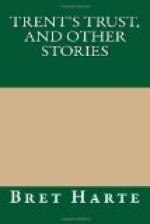“Ah, the slipper, she is forbidden. The prayer book—she must not. The dance, it is not good. Truly, there is nothing.”
For several days she sulked. One morning she did not come to school, nor the next. At the close of the third day the master called at the Hoovers’ ranch.
Mrs. Hoover met him embarrassedly in the hall. “I was sayin’ to Hiram he ought to tell ye, but he didn’t like to till it was certain. Concha’s gone.”
“Gone?” echoed the master.
“Yes. Run off with Pedro. Married to him yesterday by the Popish priest at the mission.”
“Married! That child?”
“She wasn’t no child, Mr. Brooks. We were deceived. My brother was a fool, and men don’t understand these things. She was a grown woman—accordin’ to these folks’ ways and ages—when she kem here. And that’s what bothered me.”
There was a week’s excitement at Chestnut Ridge, but it pleased the master to know that while the children grieved for the loss of Concha they never seemed to understand why she had gone.
DICK BOYLE’S BUSINESS CARD
The Sage Wood and Dead Flat stage coach was waiting before the station. The Pine Barrens mail wagon that connected with it was long overdue, with its transfer passengers, and the station had relapsed into listless expectation. Even the humors of Dick Boyle, the Chicago “drummer,”—and, so far, the solitary passenger—which had diverted the waiting loungers, began to fail in effect, though the cheerfulness of the humorist was unabated. The ostlers had slunk back into the stables, the station keeper and stage driver had reduced their conversation to impatient monosyllables, as if each thought the other responsible for the delay. A solitary Indian, wrapped in a commissary blanket and covered by a cast-off tall hat, crouched against the wall of the station looking stolidly at nothing. The station itself, a long, rambling building containing its entire accommodation for man and beast under one monotonous, shed-like roof, offered nothing to attract the eye. Still less the prospect, on the one side two miles of arid waste to the stunted, far-spaced pines in the distance, known as the “Barrens;” on the other an apparently limitless level with darker patches of sage brush, like the scars of burnt-out fires.
Dick Boyle approached the motionless Indian as a possible relief. “You don’t seem to care much if school keeps or not, do you, Lo?”
The Indian, who had been half crouching on his upturned soles, here straightened himself with a lithe, animal-like movement, and stood up. Boyle took hold of a corner of his blanket and examined it critically.
“Gov’ment ain’t pampering you with A1 goods, Lo! I reckon the agent charged ’em four dollars for that. Our firm could have delivered them to you for 2 dols. 37 cents, and thrown in a box of beads in the bargain. Suthin like this!” He took from his pocket a small box containing a gaudy bead necklace and held it up before the Indian.




